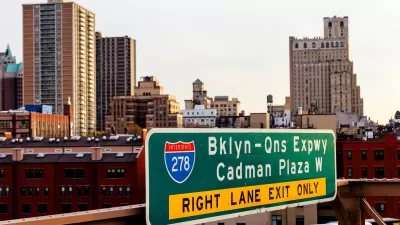The New York City roadway is desperately in need of repair, but just tearing it down and replacing it would be a shortsighted fix.

Justin Davidson ponders the future of the Brooklyn-Queens Expressway, which he would like to see come down for good rather than just replaced with the same:
So far, the city’s DOT has floated two, more or less equally horrendous options: make piecemeal repairs, causing eight years of Munch’s Scream-level congestion, or commandeer the Brooklyn Heights Promenade as a temporary highway and tolerate a different kind of misery for a mere six years.
Concerns about traffic congestion and what would happen to freight vehicles using the BQE if it went away completely should not be used to defend a replacement project that, conservatively, would cost $3 billion to $4 billion, says Davidson. Instead, he argues for a long-term vision that considers where transportation is headed—in terms of technology and travel modes—and goals like sustainability.
Davidson also spends time considering the stacked design of the BQE and the park and public space of the Brooklyn Heights Promenade. Burying the roadway, he suggests, would be a good alternative for reclaiming this space, even if a tunnel would be costly and time consuming. "To anyone who ever sat for hours, fumigated and immobilized, on the I-93 [in Boston] at rush hour, being able to stroll along the Rose Kennedy Greenway, which follows the same route, is a major urban gift."
FULL STORY: Here’s a Solution for Fixing the Brooklyn-Queens Expressway: Get Rid of It

Planetizen Federal Action Tracker
A weekly monitor of how Trump’s orders and actions are impacting planners and planning in America.

Congressman Proposes Bill to Rename DC Metro “Trump Train”
The Make Autorail Great Again Act would withhold federal funding to the system until the Washington Metropolitan Area Transit Authority (WMATA), rebrands as the Washington Metropolitan Authority for Greater Access (WMAGA).

The Simple Legislative Tool Transforming Vacant Downtowns
In California, Michigan and Georgia, an easy win is bringing dollars — and delight — back to city centers.

The Small South Asian Republic Going all in on EVs
Thanks to one simple policy change less than five years ago, 65% of new cars in this Himalayan country are now electric.

DC Backpedals on Bike Lane Protection, Swaps Barriers for Paint
Citing aesthetic concerns, the city is removing the concrete barriers and flexposts that once separated Arizona Avenue cyclists from motor vehicles.

In These Cities, Most New Housing is Under 441 Square Feet
With loosened restrictions on “micro-housing,” tiny units now make up as much as 66% of newly constructed housing.
Urban Design for Planners 1: Software Tools
This six-course series explores essential urban design concepts using open source software and equips planners with the tools they need to participate fully in the urban design process.
Planning for Universal Design
Learn the tools for implementing Universal Design in planning regulations.
Smith Gee Studio
City of Charlotte
City of Camden Redevelopment Agency
City of Astoria
Transportation Research & Education Center (TREC) at Portland State University
US High Speed Rail Association
City of Camden Redevelopment Agency
Municipality of Princeton (NJ)




























